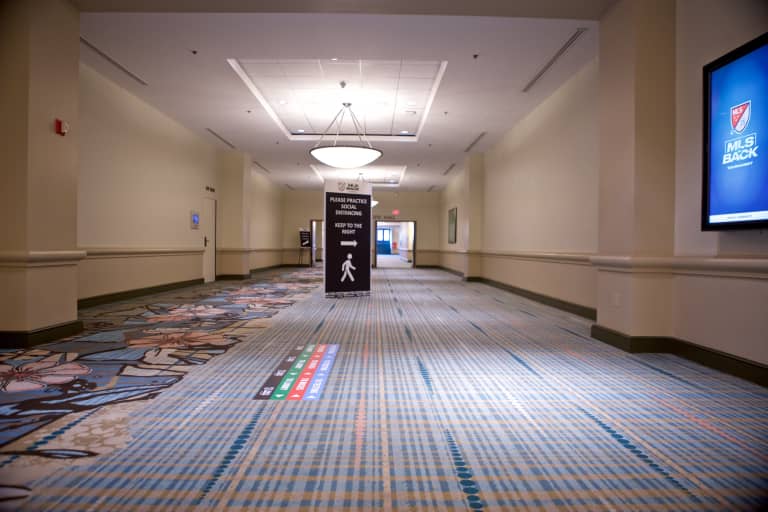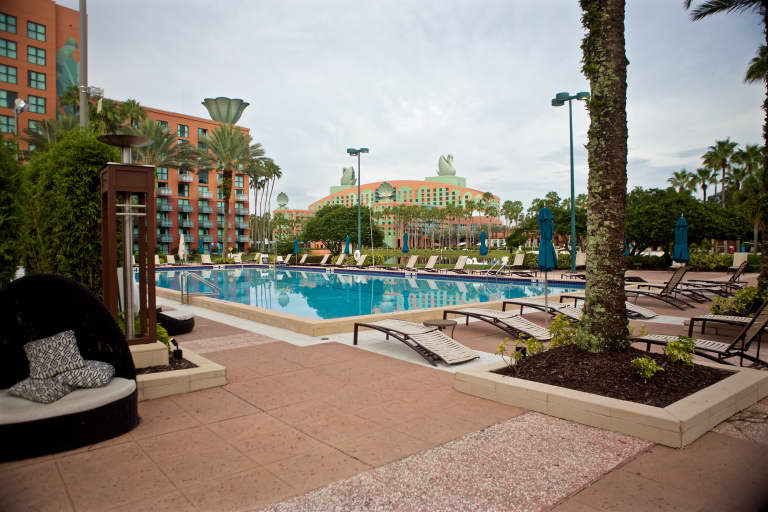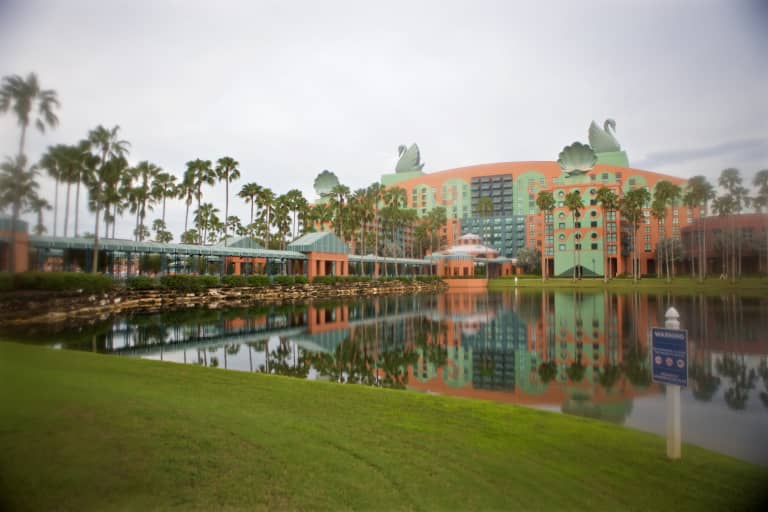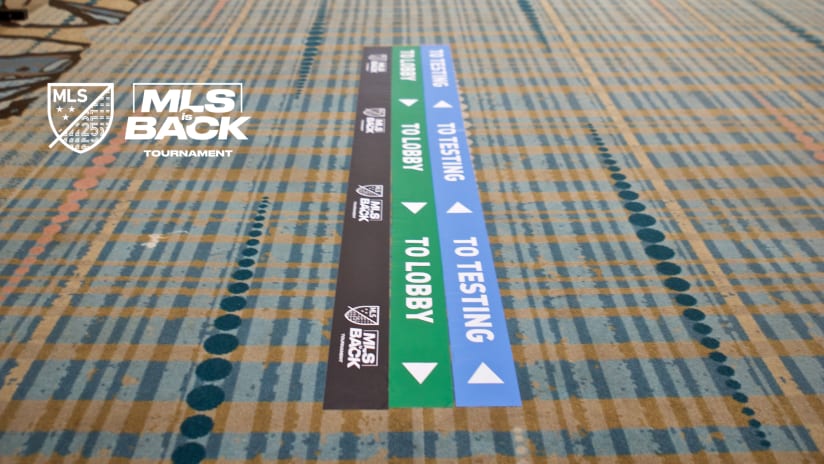ORLANDO, Fla. – From outside the Swan and Dolphin hotels at the Disney World resort in Orlando, Florida, the image of Major League Soccer’s “bubble” is a singular one. The league’s 26 teams from around North America have convened to try, under a set of shared health and security protocols, to bring men’s professional soccer back in the time of COVID-19. Between players, staff and officials, over one thousand people are adhering to an agreed set of rules, hoping to revive the league’s once postponed season.
Read in certain tones, it sounds like the introduction of an old episode of MTV’s The Real World. What happens when a thousand strangers agree to have their lives taped, only instead of having their lives taped, players have nasal swabs draw samples from them every other day, and live in a world where hand sanitizing stations outnumber people walking through a hotel’s lobbies, foyers and halls.

Photo: Richard Farley / Portland Timbers
That’s the reality inside the bubble, a metaphor born of the idea that the situation is as self-contained as possible. In a strict sense, the metaphor doesn’t hold. Staff operating the tournament’s logistical arm get tested, just less frequently then players, staff, or game officials. They stay in a different hotel, though have responsibilities within the Swan and Dolphin. Most hotel staff are being tested, too, though a select few who stay out of contact with the tournament’s principles are on site. Red lanyards holding their tournament credentials highlight them as “too be avoided” personnel.
Within those realities, clubs have taken different approaches. Instead of the property functioning as one, uniform experience, teams have created an environment where there are 26 bubbles within one. At least. Every group has their own floor within a wing of their hotel, allowing every party to set different expectations. Each bubble also has subtly different moods.
“It’s been six days since we got here. It’s been just going to practice, staying in your room. Try to stay within your group,” Timbers left back Jorge Villafaña said in an Instagram Live video. “We have certain rules that we have to follow in order to follow the protocols that have been mandated here. Everybody is taking it seriously, as it should be. We’re excited to be here, and to start playing.”
The visual realities, cast within one of the world’s most famous tourist destinations, are striking. Poolside bars and cabanas around a series of pools sit empty, as if evacuated. Chaise lounges facing an artificial lake are more likely to be visited by ducks than players. One or two times each day, a small group tries a game of beach volleyball, but the games are so rare, you take note. Those people are starting to adjust. They’re taking a step toward normal.
Even within those moments, teams are staying to themselves, a reality that’s reinforced inside the hotels. Lobbies, concierge stands, bellhop stations and check-in desks sit mostly empty. The activity on paths around convention room halls is purposeful. Nobody lingers. When people interact between bubbles, it’s isolated to small groups – the few people who have worked together, before. Even then, those meetings have an obligatory feel.
“I personally feel safe,” Timbers right back Chris Duvall says, “but I also am in a position where I understand my situation. I’m a single person. I know that my health is only for me. The guys that have families are a little bit more wary of the risk. But for me, I’m enjoying being here … There are enough protocols in place that I feel like any risk that you’re taking is primarily your own …”
Part of offsetting that risk is the relative isolation. Trees as far as the eye can see in every direction cordon off Disney from the rest of the world. Similar barriers feel like they exist between floors. No elevators are shared with people outside your group, and when somebody accidentally gets off on the wrong floor, it becomes a point of gossip, and reproach. There’s nothing casual about getting off on five when the rest of your group is on four.

Photo: Richard Farley / Portland Timbers
To compensate, teams have expanded options within their bubbles. Three rooms on the Timbers’ floor have been made into player lounges: one has a PlayStation; one is a general television watch room; another has a poker table. A ping-pong table next to the wing’s elevators has become a venue for Duvall and defender Bill Tuiloma to battle for the team’s implied throne, while small gatherings in hallways between training sessions, treatment, re-hab and meals provide an reprieve beyond players’ rooms.
“So far, among ourselves and our group, we definitely feel very safe,” head coach Giovanni Savarese said in a press conference during the Timbers’ first week in Orlando. “That doesn’t take away the fact that we, at all times, always, are making sure to give reminders to wear masks, not to [let] our guard down.
“I think MLS has worked very hard to try and create a safe environment, but nevertheless, we have to make sure to always take [into account], as a priority, the health of the players, making sure that they’re safe.”
Savarese’s words allude to his team’s broader approach, one implemented in earnest when the Timbers returned to their facility in Beaverton, Oregon, for May training sessions. Since then, players and the staff who interact with them have been regularly tested, with the ramp-up to the MLS Is Back Tournament featuring RT-PCR testing conducted three times a week over the course of a month. Meals delivered to players’ residences at the beginning of coronavirus isolation also helped players adjust to new lives, ones that presented unique challenges because of the abundance of small children among Timbers’ families.
“[Safety is] obviously a regular topic of discussion,” Timbers President of Soccer Gavin Wilkinson said, “and the constant education and dialogue with all staff and players has been extremely important in establishing common expectations.
“The staff and players made a commitment to one another,” Wilkinson explained,” and we need to stay vigilant in our day-to-day lives with a responsible approach that gives everyone in the traveling party the best chance to stay healthy, safe and to perform. Everyone has been tremendous, but I am especially proud of the way our medical team and performance staff have worked tirelessly to ensure we are doing everything possible to achieve these objectives.”
For the Timbers, the main difference in Orlando is that lack of family. Wives and kids are still at home. While some at MLS Is Back have been surprised by the measures at the resort, the measures replicate a life Portland had already accepted. In many ways, Orlando feels like an extension of the Timbers’ life at home.
“I really believe that the most important part is what teams have done in their own market,” Savarese said. “That makes the biggest difference.”

Photo: Richard Farley / Portland Timbers
That approach, though, has entailed a lot of sacrifice. The reality of COVID-19 in the United States is one defined by risk. Every move outside of your residence becomes calculated. What risks do I encounter at the grocery store? The post office? At my job, or even my relatives’ houses?
And what risks do we pose to each other? In Orlando, two teams have had to leave the tournament because of the COVID-19 infection rates within their groups. Just as elsewhere in the world, the situation requires vigilance. The vigilance built into MLS’s bubble has thus far limited major problems to those two groups.
Three games into the tournament, Portland’s players are still confident in their safety. But they know they have to stay on their guard. They know their security comes from staying alert. They know the balance their choice entails.
“Everyone needs to understand that the decision to come here was just that. It was a decision,” Duvall explains. “We decided to come here, but it wasn’t a unanimous vote. Everyone had their own motives, had their own personal reasons why they should and shouldn’t come. It’s just like any other decision we make that’s massively important in our lives. You have to weigh everything in your own situation, and mine is going to be different from the next guy’s.
“As much as this experience is something that I wanted and I’m OK with the risks – and I’m happy to be here with all the positives that I see – everyone has to understand that there are so many different sides to it. There are so many guys that are coming from different situations.”
This may be how sports come back. The coronavirus isn’t going away in the near future, and everyone’s comfort level will be different. With the United States showing a desire to establish a new normal – and debates around that desire progress – there’s an obligation to find safety within a new world. “Can we keep people safe” defines how organizations like Major League Soccer try to move forward.
For now, the Timbers have accepted the “bubble” and are trying to thrive within it. In terms of safety, that approach is working. For now.












